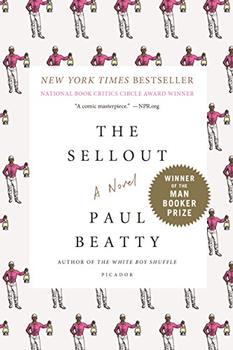Summary | Excerpt | Reviews | Beyond the book | Read-Alikes | Genres & Themes | Author Bio

A Novel
by Gary ShteyngartForget suspense thrillers and horror novels. Forget zombies and vampires and things that go bump in the night. If you are passionate about books and reading, if you value real work, if you love America, Gary Shteyngart's Super Sad True Love Story just might be the scariest book you read this year. What's most frightening - and, yes, saddest - about Shteyngart's satirical third novel is just how plausible the whole thing is.
Many dystopian novels result from creative writers taking a "worst-case scenario" point of view, extending current patterns and trends into the future to see just how bad things can get. Here Shteyngart doesn't have to push very far for things to get very bad indeed. In this near-future world, people bank with LandO'LakesGMFordCredit and fly on UnitedContinentalDeltamerican Airlines. Using their omnipresent "äppäräti," they chat with each other on GlobalTeens, comically misusing the English language and affectionately calling each other "'tard" and "betch," concocting ever more obscene acronyms with which they litter their conversations (such as they are).
Into this brave new world stumbles Lenny Abramov, who, with his love of literature and his ability to form complete sentences, seems like an old man, a relic even, at the ripe old age of thirty-nine. "I remember reading the Times in the subway," Lenny recollects fondly, "folding it awkwardly while leaning against the door, caught up in the words, worried about crashing to the floor or tripping over some lightly clad beauty (there was always at least one), but even more afraid to lose the thread of the article in front of me, my spine banging against the train door, the clatter and drone of the massive machine around me, and me, with my words, brilliantly alone."
Lenny might not work in the glamorous worlds of Media or Credit (the only truly worthwhile professions), but he does have power of a sort, vetting applicants to determine which ones are worthy of immortality. For Lenny, though, immortality seems to come in the form of a woman, Eunice, whose exuberance, youth, beauty, and assertiveness does, for a time, seem to help Lenny's world make sense.
In alternating sections, Shteyngart tells his story through Lenny's deliberately old-fashioned diary entries and Eunice's simplistic, naïve but increasingly desperate online communications. Doing so not only highlights the linguistic, generational, and philosophical divide between these star-crossed lovers but also demonstrates Shteyngart's facility with language, as everything from syntax to allusions to word choice serve to contribute to the thematic subtext of Lenny and Eunice's story.
The sheer closeness of Shteyngart's dystopian culture to our own is both the fodder for hilarious satire - individual scenes, sentences, even phrases are uproariously funny - and the stuff of pathos. Lenny's longing for a different time is mirrored by the reader's own; his desire for something to hold onto has certainly been felt by anyone who feels propelled, uncontrollably, by geopolitical forces, economic complexities, and technological advances. As he rides the Staten Island Ferry, Lenny reflects on the increasingly alien landscape: "Every returning New Yorker asks the question: Is this still my city? I have a ready answer, cloaked in obstinate despair: It is. And if it's not, I will love it all the more. I will love it to the point where it becomes mine again."
And, in the end, Shteyngart's novel is about love - of places, for words, for parents and children and lovers and friends. Such love might not stop the seemingly relentless rush toward destruction or at least absurdity, but it might slow it down just long enough for us to find someone's hand to hold as we sweep, together, into an uncertain future.
![]() This review
first ran in the September 8, 2010
issue of BookBrowse Recommends.
This review
first ran in the September 8, 2010
issue of BookBrowse Recommends.

If you liked Super Sad True Love Story, try these:

by Paul Beatty
Published 2016
The Sellout is the first book by an American author to win the UK's prestigious Man Booker Prize.
A biting satire about a young man's isolated upbringing and the race trial that sends him to the Supreme Court, Paul Beatty's The Sellout showcases a comic genius at the top of his game. It challenges the sacred tenets of the United States Constitution,...

by Boris Fishman
Published 2015
A singularly talented writer makes his literary debut with this provocative, soulful, and sometimes hilarious story of a failed journalist asked to do the unthinkable: Forge Holocaust-restitution claims for old Russian Jews in Brooklyn, New York.
Your guide toexceptional books
BookBrowse seeks out and recommends the best in contemporary fiction and nonfiction—books that not only engage and entertain but also deepen our understanding of ourselves and the world around us.